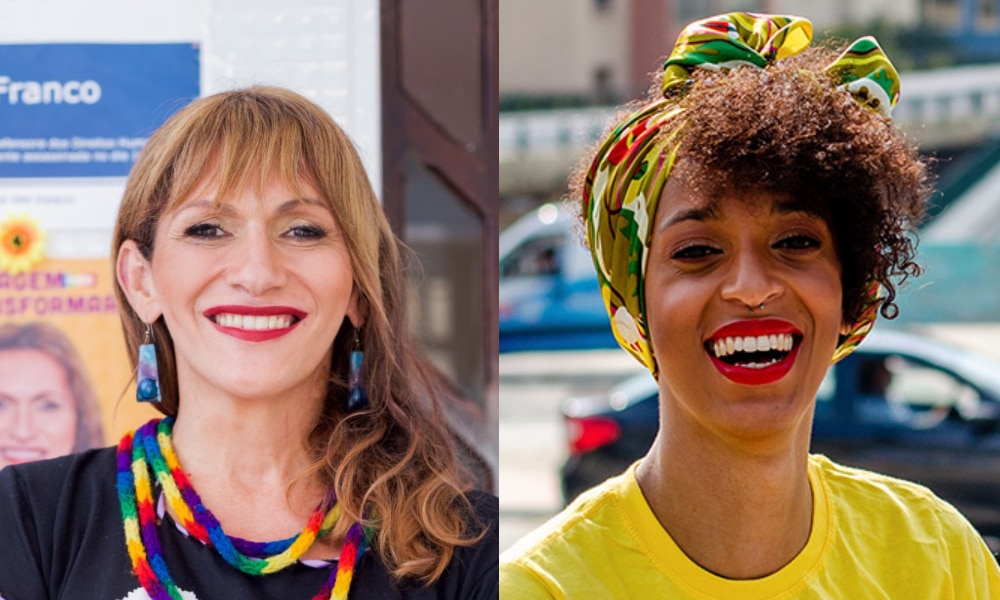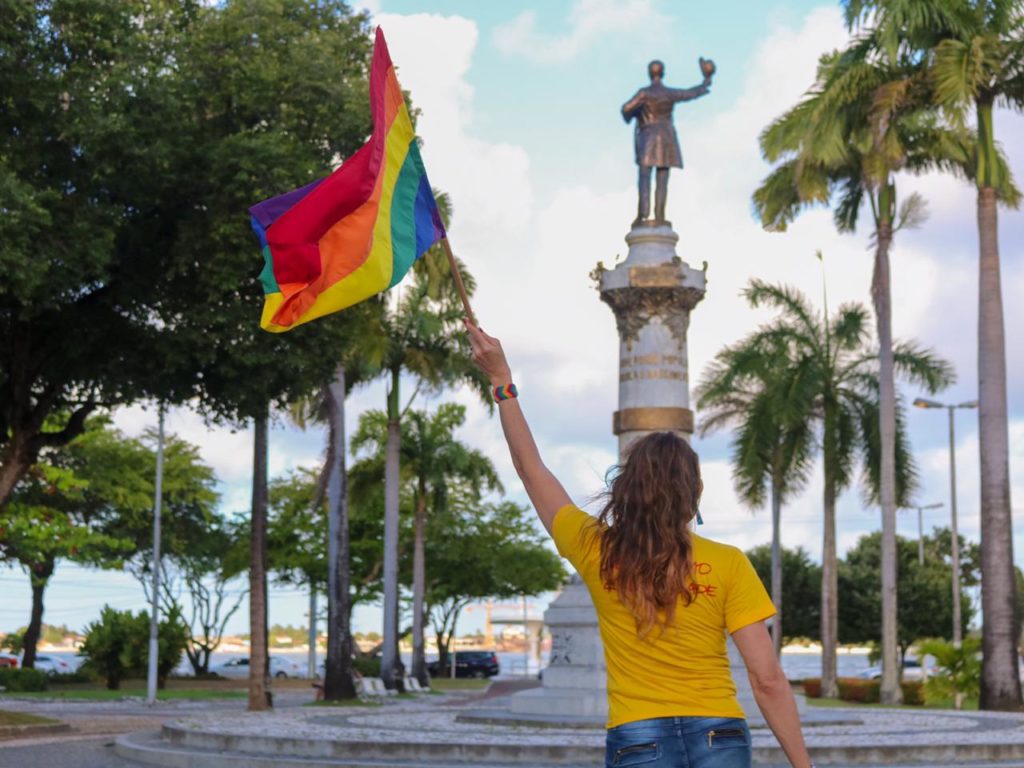Meet the trans lawmakers who broke brave new ground in Brazil, the world’s deadliest country for trans people

Linda Brasil (L) and Erika Hilton. (Supplied/Rafael Canoba)
Brazil held its local elections 15 November, 2020 and thousands of city councillors were elected throughout the country.
In the midst of a pandemic and with an openly anti-LGBT+ far-right federal government, the results indicated a growing presence of LGBT+ activists from the most diverse political parties and spectres.
While candidates supported by president Jair Bolsonaro suffered devastating defeats and the number of elected officials who used religious titles – such as a pastor, missionary and the like – and who are commonly at the forefront of homophobic preaching, tumbled.
This year, the LGBT+ community elected 48 city councillors and received more than 450,000 votes – and transgender candidates deserve special mention in the country that kills the most trans people in the world.
Twenty-five trans people were elected, an increase of 212 per cent compared to previous local elections in 2016. The number is undoubtedly small if we consider that more than 56,000 councillors were elected, but it cannot be simply dismissed.
Trans candidates have managed to increase their presence nationally and still rank among the most voted in some state capitals.
Trans and intersex people ‘ascend’ after scoring huge wins in local elections
Two of the candidates most voted for São Paulo’s city council are trans, Erika Hilton (elected by the left-wing Party Socialism and Freedom) and Thammy Miranda (elected by the right-wing Liberal Party).
Hilton is also the woman most voted and the sixth overall in the biggest city in the country, with 59,000 votes.
Her victory, she told PinkNews, “means a break with a process of stigmatisation, marginalisation and under-representation in areas of power and in society as a whole.”
Hilton added that “even if we are taking small steps, we are moving towards the rescue of our humanity, our human dignity, the recognition of our civil and human rights, and placing ourselves as first-class citizens”.
And it wasn’t easy for Hilton to get to this point.
“In my trajectory, the meaning of this expressive result is that even being expelled very young [from home], the prostitution, the dehumanisation of my body, I managed to stay alive, to anchor myself in the ancestral struggle that precedes me.
“I managed to open paths in the midst of so many thorns and so many difficulties so that I could transform my pain and my anguish into a beautiful process of structural and structuring propositions for me and for all society.”

Linda Brasil (L) and Erika Hilton. (Supplied/Rafael Canoba)
The candidate most voted in Aracaju, capital of the state of Sergipe, is trans, Linda Brasil. The best-voted candidate in Belo Horizonte, capital of Minas Gerais, Duda Salabert, is also trans.
“I am a trans woman who did not run away from statistics and ended up being pushed into prostitution,” said Brasil.
“I had to go to Italy, I lived there for five years, I lived from prostitution, I went through a lot of social vulnerability and when entering the UFES [Federal University of the State of Sergipe] I became aware of how important it is for us to occupy spaces.
“For me, it means that it was worth all this struggle and it gave me more strength and more hope to fight for the rights of all people who suffer violence, who have no opportunities, who are marginalised and stereotyped by society.”
Brasil has a MA in education and “the basis of the fight against LGBT-phobia, sexism and consequently gender violence, is related to the issue of education [therefore] we have to take this debate to sensitise and raise awareness among young people, the general population, students, about gender issues, how this social construction of gender and unequal social roles cause inequality and violence”.
Her election, she said, “represents a victory for an entire movement, for the struggle of the LGBTQA+ population in favour of our rights, but also in favour of those who are fighting for a reduction in violence against our population.”
A Brazil seemingly inured to anti-LGBT+ violence welcomes its first intersex city councillor
Also elected by the Socialism and Liberty Party, was Carolina Iara. She was voted in as a member of a collective candidacy, when a group of activists unite to contest the election and, elected, take up the mandate collectively, called Bancada Feminista,
A Black, trans, intersex social scientist living with HIV, Iara said that “being elected with more than 46,000 votes along with incredible feminist women is a personal milestone for me, especially for someone like me who still live in a neighbourhood with a lot of poverty, coming from a humble family of workers and having gone through so much suffering, genital mutilation for having genital and sexual ambiguity, and having come so far, to a decision-making post in the largest city in South America”.
“I would certainly give a lot of pride to Altina, my illiterate grandmother, as well as to Gisa Oliveira, my nursing mother,” she added.
Iara is the first intersex to ever been elected in Brazil and she said that “my body has various representations of historical social struggles for civil rights, the right to health, anti-racism and the fight against transphobia and genital mutilation of intersexed babies.
“So, the visibility of my election is enormous.”
The 10th councillor with the most votes in the city of Araraquara, in the interior of São Paulo, Filipa Brunelli, the first trans person elected in the city, representing the Workers’ Party. She explained that her election “means several things, mainly the occupation of institutional spaces that are used to oppress bodies like ours, it means progressive resistance with the advance of conservatism”.
Her mandate will be marked by dialogue “across different areas, but all based on the principle of human rights, with an emphasis on marginalised populations and popular participation”.

Linda Brasil, a city official in Aracaju, struggled for years as a sex worker before going into education. Through her studies, she said, she realised the importance of visibility
Anabella Pavão (from the Socialism and Freedom Party) has a PhD in Social Services and was elected in Batatais, also in São Paulo.
She said that her election “means an awakening of part of the population to sexual diversity, which seeks to recognise the LGBT+ population, especially transvestites and transsexuals, beyond sexual orientation and gender identity, understanding that we are as citizens as anyone else”.
This result, she said, “also demonstrates that we LGBTs are so capable of occupying elective spaces and that our difference over others does not cancel us out as political subjects.
“I also believe that the increase in LGBT+ victories in these 2020 elections is the popular outcry for change, for an end to prejudice and an accurate and important response against [Jair] Bolsonaro.”
Common among all elected trans officials is not just an unbridled desire to defend LGBT+ rights, but also education, health, housing and even urban mobility.
Showing that beyond the important question of representation, they will defend the rights of others, if not all marginalised populations and their victories represent, as Brasil said: “A breath of hope in this dark moment that Brazilian politics is going through.”
Brunelli added that it is amazing for so many trans activists to “ascend in a transgressive way to a hygienic and opportunistic system”.

